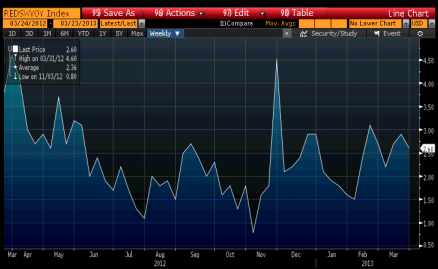Remaining soft

Full size image

>
> (email exchange)
>
> Dijsselbloem made very clear that the shareholders, then the bondholders and then the
> uninsured deposit holders are at risk when a bank gets into problems.
>
Yes.
>
> Looks like eur / usd will go down until Draghi comes out and says that the ECB will do
> whatever it takes to protect depositors. How do you see eur / usd now that this Cyprus
> precedent is set and Dijsselbloem’s clear statements?
>
Good question! Technically the euro goes down from portfolio shifts. But the euro also gains fundamental support from the coercive reduction of net financial assets.
The yield spreads adjust to discount the risk of confiscation, further supporting the German premium regarding member nation debt.
It would be the same with bank deposits but for the ECB’s lending to banks capping funding costs. So more deposits shift to German banks and ECB lending increases.
The Greek PSI was declared a one and only event but now the credibility of that and any other proclamation is gone.
‘Whatever it takes’ now clearly includes taxing bank deposits as well as bond holdings, and not to forget transactions taxes.
All for the further purpose of debt reduction, also known as the reduction of net financial assets of the non government sectors.
And worse.
The very promise of the euro has turned from harmony and growth to blood sweat and tears without end, and without further public purpose.
All begging the question:
‘So what’s the point?’
>
> On Monday evening there was a long interview with Dijsselbloem on Dutch TV after the
> markets reacted so heavily in the afternoon after his remarks. He did not take one word
> back. Indirectly his statements made very explicit that the deposit guarantee system in
> the euro zone has its limits due to the limits of the member states that are not
> monetarily sovereign anymore. When the interviewer asked him if the 100K limit is not
> too high, He admitted that it is very high. He did not yet make the step that only a
> guarantee from the ECB would be credible and able to cover 100% of deposits.
>
Not good.